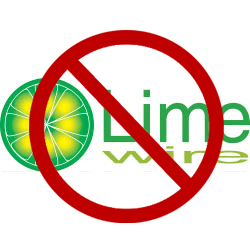
 As a result of relentlessness attacks by the dying music industry against P2P services, one of the biggest players in the sharing scene LimeWire has been forced to shut down its service for a minimum of 6 months as a result of a court order.
As a result of relentlessness attacks by the dying music industry against P2P services, one of the biggest players in the sharing scene LimeWire has been forced to shut down its service for a minimum of 6 months as a result of a court order.
The order was definitely settles this Tuesday when U.S. District Judge Kimba Wood in Manhattan entered a permanent injunction, ordering the service to disable the searching, downloading, uploading or file trading of its software and to block the sharing of unauthorized music files.
If you head over the LimeWire website, you’ll find yourself greeted by a pop-up simply stating: “Downloading or sharing copyrighted content without authorization is illegal.” Yes, LimeWire is in deep shit.
As such, LimeWire has joined the ranks of other defunct large P2P clients like Napster, Grokster, Kazaa, as well as other smaller piracy epicenters who have silenced by the law along the years.
The New York company was found liable for copyright infringements for the first time this May, and will have to face the court once again in January when the company, along with its former CEO and founder Mark Gorton who is held responsible at a personal level, will be put face to face with the damage LimeWire has caused during it’s almost 10 years existence. Penalties will most probably be grossed to the tens of millions at least, damage which the company will be forced to pay.
“Plaintiffs have suffered—and will continue to suffer—irreparable harm from LimeWire’s inducement of widespread infringement of their works,” the judge wrote in her order.
The company’s corporate parent, issued a statement shortly after the court order was made public expressing its disappointment in the decision. “We are extremely proud of our pioneering history and have, for years, worked hard to bridge the gap between technology and content rights holders,” LimeWire Chief Executive George Searle said in the statement. “However, at this time, we have no option but to cease further distribution and support of our software.”
LimeWire officials are reporting that they’re currently prepping a paid subscription service, such that the service may go completely legal. Napster, now owned by Best Buy, tried this approach in the past as well but has failed miserably. The problem however isn’t the business model behind this seemingly desperate approach, despite the fact that LimeWire can very well capitalize on its more than 200 million user base, but rather the record industry’s feud with the P2P giant with whom they’ve been battling through courts since 2006.
In related news, the press is reporting on the formation of a new Internet Piracy Police in France called the the Hadopi, which will be responsible for monitoring illegal downloads over the web and sending out notices to downloaders. Hadopi was born out of a new French anti-piracy law passed last year, and is essentially a partnership between the government and trade groups representing the film and music industries, which pay for the monitoring.


